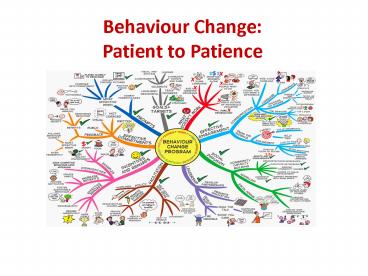Behaviour Change: Patient to Patience - PowerPoint PPT Presentation
1 / 23
Title: Behaviour Change: Patient to Patience
1
Behaviour Change Patient to Patience
2
Outline of Presentation
- Behaviour Change
- Behavior and public health
- Determinants of behavior
- Stages of behaviour change
- Behaviour change process
- Enabling factors
- Channels of communication
- Myths and facts regarding behaviour change
- Conclusions
3
Behaviour Change 1
List the important changes in the pictures ???
4
Behaviour Change2
Today its me, because of u...Tomorrow its u,
because of me...
Fully burnt Cigarette ASH
Smokers Lung
Quit smoking... Tar the roads... NOT your LUNGS!
5
Behaviour Change3
- Increased interest of behaviour change in
different fields with the hope that understanding
it will improve the services offered - Health
- Education
- Criminology
- Energy
- International development
- Behavioral change theories have gained
recognition in health for their possible
effectiveness in explaining health-related
behaviors and providing insight into methods that
would encourage individuals to develop and
maintain healthy lifestyles
6
Behaviour Change4
- Different terms used for behaviour change
- Strategic Behavioral Communication (SBC)
- Information, Education, Communication (IEC)
- Communication for Social Change (CSC)
- Behaviour change communication (BCC)
7
Behaviour Change 5
- Many theories exist for Behaviour change, the
most prevalent are - Learning theories
- Social Cognitive Theory
- Theories of Reasoned Action and Planned
Behaviour - Trans-theoretical Model
- Health Action Process Approach
8
Outline of Presentation
- Behaviour Change
- Behavior and public health
- Determinants of behavior
- Stages of behaviour change
- Behaviour change process
- Enabling factors
- Channels of communication
- Myths and facts regarding behaviour change
- Conclusions
9
Behaviour Public Health
Fortunately, human beings have, in theory,
control over their conduct
Smoking
- Non communicable diseases such as (NCDs)
- Diabetes
- Obesity
- Hypertension,
- Cancers, etc.
Alcohol
Dietary
Behaviours
Diseases
Behaviour Change
Physical Activity
Sexual Activity
HIV, STD, Hepatitis
Healthy life
Substance abuse
Mental Disorders
Rash Driving
Road Traffic Accidents
Health-compromising behaviors can be eliminated
by self-regulatory efforts, and by adopting
health-enhancing behaviors
10
Outline of Presentation
- Behaviour Change
- Behavior and public health
- Determinants of behavior
- Stages of behaviour change
- Behaviour change process
- Enabling factors
- Channels of communication
- Myths and facts regarding behaviour change
- Conclusions
11
Determinants of
health related behavior
12
Outline of Presentation
- Behaviour Change
- Behavior and public health
- Determinants of behaviour
- Stages of behaviour change
- Behaviour change process
- Enabling factors
- Channels of communication
- Myths and facts regarding behaviour change
- Conclusions
13
How to change behaviour ???Five stages of
behaviour change
Stage 1 Precontemplation
Stage 5 Maintenance
Stage 4 Action
Stage 2 Contemplation
Stage 3 Preparation
14
Stages of Behaviour change Diabetes
Stage 1 Precontemplation
Stage 2 Contemplation
Stage 3 Preparation
Stage 4 Action
Stage 5 Maintenance
I dont have disease ..
I am no more Happy I am worried I am having
Diabetes
I am ready to change
I am doing
I will continue to do.
- I want to LIVE... I will save myself
- Prevention is better then cure
- Learn regarding healthy practices
- Filter facts from Myths
- Doctor calling
- Dietary changes
- Physical activity
- Regular medicines
- Positive re-enforcement, Negative re-enforcement
and awarding - Opinion leader
Why should I change ????
15
Diffusion of Ideas Model
- People are more likely to adopt a new behavior
when someone they respect or admire endorses the
behavior - Opinion leaders influence an initial group
- New social norm is established
- Rest of community follows (Social conformation)
16
Outline of Presentation
- Behavior Change
- Behavior and public health
- Determinants of behavior
- Stages of behaviour change
- Behaviour change process
- Enabling factors
- Channels of communication
- Myths and facts regarding behaviour change
- Conclusions
17
Behavior Change Process
- Channels
- Stages of change continuum
Enabling factors
- Unaware
- Aware
- Concerned
- Knowledgeable
- Motivated to change
- Trial behaviour change
- Sustained behaviour change
- Mass media
- Community networks and traditional media
- Interpersonal/group communication
- Effective communication
- Enabling environment
- User friendly services and accessible commodities
18
Outline of Presentation
- Behaviour Change
- Behavior and public health
- Determinants of behavior
- Stages of behaviour change
- Behaviour change process
- Enabling factors
- Channels of communication
- Myths and facts regarding behaviour change
- Conclusions
19
Myths and facts about behaviour change
- Myths
- Facts
Crisis is a powerful impetus for change
- Change is motivated by fear
- People go into denial of the bad things that
might happen to them
- To achieve sustainable results, it takes time.
- Regular reinforcements are needed
We can't change because our brains become
"hardwired" early in life
- Majority of patients don't sustain changes in the
unhealthy lifestyles that worsen their disease - Change for better is always difficult to make
Behaviour change methods dont yield adequate
results
We can continue learning complex new things
throughout our lives
- Behaviour addressed should be the felt need of
the people targeted - Community involvement is important for success
of any change process
Change in behaviour is not sustained
20
Behavior change is a continuous process
- It involves strong community participation
- Refutes myths and corrects misunderstanding
- Social norms and public policies influence
behavior change. A strategic shift must be also
be attempted simultaneously. - BCC often complements and supports other
prevention strategies and approaches
21
Outline of Presentation
- Behaviour Change
- Behavior and public health
- Determinants of behavior
- Stages of behaviour change
- Behaviour change process
- Enabling factors
- Channels of communication
- Myths and facts regarding behaviour change
- Conclusions
22
Stepped approach to change
A journey of a thousand miles begins with a
single step
23
Thanking You































